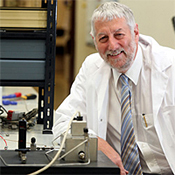Cardiff University is home to one of the largest catalysis research groups in the world, led by Prof. Graham Hutchings. This research group is known as the Cardiff Catalysis Institute (CCI) and is a world leader in its field, researching everything from how Gold can be catalytically active to new exhaust systems that meet European Union directives for car emissions. The prestige of this institute has been recognised by GovernmentÔÇÖs ┬ú350 million investment in setting up Centres for Doctoral Training (CDT) around the UK with the CCI taking the lead for doctoral training in catalysis. This is the UKÔÇÖs largest ever investment in postgraduate training in engineering and physical science and the catalysis CDT is a partnership between Cardiff, Bath and Bristol Universities.
Science Minister David Willetts said of the achievement: ÔÇ£Scientists and engineers are vital to our economy and society. It is their talent and imagination, as well as their knowledge and skills, that inspire innovation and drive growth across a range of sectors.ÔÇØ Indeed, catalysis is key to our everyday lives producing everything from the plastics used in everyday objects to pharmaceutical compounds used to keep us healthy. Catalysts are industrially important; some processes become impossible without them. This is due to catalysts being an agent that allows reactions to follow a lower energy pathway, letting us use less energy and resources as a consequence.
Prof. Karen Holford, PVC of the College of Physical Sciences & Engineering said ÔÇ£This funding is targeted at areas vital to economic growth and is good news for CardiffÔÇÖs thriving postgraduate community.ÔÇØ Indeed, the CCI currently employs roughly 50 postgraduate students and many postdoctoral researchers, people who are at the beginning of their academic career. With this expansion, it is hoped more students can come to Cardiff and launch their careers as part of a world leading team and help boost CardiffÔÇÖs reputation worldwide.
The CCI has a remit of developing clean and sustainable technologies for clean energy creation and environmental clean-up of air and water. It was only recently that the CCI partnered with Solvay and Selden in an attempt to create catalysts for the treatment of wastewater. It is hoped that pollution from factories and chemical plants can be further reduced by the catalytic decomposition of waste chemicals into benign agents. The CCI also helps companies such as Scania and Jaguar Land Rover develop new catalytic systems to minimize particulate emissions and provide a cleaner, safer car emission profile. Prof. Stanislaw Golunski, a key part of the establishment of the Cardiff CDT said to gair rhydd: ÔÇ£Doing a PhD at the Catalysis Centre will be a fantastic experience. Imagine having a whole year before you decide on your research topic. During that first year, you will spend time in Bath, Bristol and Cardiff exploring the different aspects of the catalytic industry and engineering that will prepare you for the research path you choose.ÔÇØ
The Centre will not only equip people with PhDs but will spend an additional year training students in general chemistry to give them a sound footing in physical science. This interdisciplinary approach, led by Cardiff will also involve students having lectures at Bath and Bristol, both members of the Great Western alliance (GW4).
Prof. Graham Hutchings, Director commented, ÔÇ£This interdisciplinary programme will allow postgraduates to develop an advanced knowledge of traditional and emerging catalysis disciplines, an understanding of industry and global contexts plus research and professional skills.ÔÇØ Cardiff is a partner in two further Centres for Doctoral Training (CDT). The Water Informatics: Science and Engineering (WISE) CDT led by Exeter and the Diamond Science and Technology CDT led by Warwick University and partners. WISE is hoped to foster new levels of innovation and collaboration on factors that impact the water cycle whereas Diamond is tasked with enabling innovative technologies for emerging scientific applications.
Paul Golby, the European Physical Sciences Research CouncilÔÇÖs (EPSRC) chair, said: ÔÇ£Centres for Doctoral Training have already proved to be a great success and the model is popular with students.ÔÇØ Everyone in the CCI is looking forward to its new chapter and how they can be key to its success here at Cardiff.
Scott Davies





Add Comment